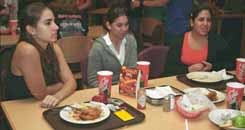The health code violations that plagued Loyola’s dining facilities for years seem to have disappeared.
“No Violations,” said a report that was filed on May 15 with the Orleans Parish Health Department. This sweeping declaration of cleanliness was earned by the main kitchen, which produces all of the food served in the Orleans Room and the Senior Commons Room. The Java Coast coffee bar in the Underground and the Smoothie King also were included in the report.
According to Loyola’s executive chef, Gary Zachariah, the improvements in health and safety came as a result of changes within Sodexho USA, the company that manages and operates Loyola’s dining facilities.
“The company, internally, has really raised the bar,” he said.
Zachariah said the improvements came by implementing the Hazard Analysis Critical Control Point, a management system that specifically targets the safe handling of food from the time it is purchased to the moment it is served.
All of the managers and supervisors also undergo ServSafe training, a professional course that deals with educating the food service industry on topics such as proper refrigeration temperature, procedures for washing and sanitizing dishes and understanding the various types of food-borne illnesses.
The managers and supervisors pass on this information to their employees and are recertified every two years, Zachariah said.
Despite the Heath Department’s findings, some people who use the Orleans Room have reservations about the cafeteria’s overall cleanliness. Allen Nisbet, associate professor in the College of Music, said that the silverware is sometimes dirty or that there is often no silverware.
But Erica Anderson, psychology junior, said that she has “never really noticed anything unsafe, except for today, I noticed flies around the pizza.”
Valerie Poullette, an instructor in the College of Music, said that the improvements that she has seen over the past few years. She said that the O.R. is much better than it was 15 years ago.
“There are more choices, and the quality of the food is better,” she said.
According to Nisbet, “You can almost always find something you like.”
Susan Do, communications sophomore, said she has noticed some of the employees’ safe food-handling practices such as changing and discarding latex gloves.
However, Loyola’s kitchens and dining rooms were not always so clean. In a routine inspection in April 2000, the kitchen staff was cited for a spill in the walk-in cooler and fruit flies in a serving area, according to Health Department records.
Again, in May of the same year, a complaint was filed with parish health department officials after a cook spotted a rodent in the Underground.
According to the report, the cook told officials that he saw a squirrel on the furniture and in the kitchens. In this case, a trapping company was called to capture the squirrel, and it was “released in a wooded area.” All of the affected food was discarded, reports said.
At Tulane, which is also managed by Sodexho, past citations have included “hamburger buns not six inches off floor,” and a violation for slimy mold on a collection site for beverage dispensers.
But in a Sept. 23 inspection, Tulane’s University Center also received a “No Violations” report.
And this is not easy, since past violations on both campuses have ranged from serious citations concerning cleanliness such as a “kitchen not clean” in Bruff Commons at Tulane or a “fryer not clean” in the Underground, all the way to more innocuous errors such as “ice scoop left in ice” at Tulane’s University Center.
“Before I started with this company, I knew very little about health and safety, and now I’m an expert on it,” Zachariah said.

Elroy Chopin dishes out food in the Orleans Room kitchen during lunch. Latex gloves are part of the safety measures that Dining Services employees are taking to ensure that food isn´t contaminated.







